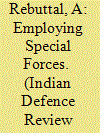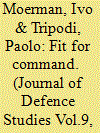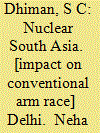|
|
|
Sort Order |
|
|
|
Items / Page
|
|
|
|
|
|
|
| Srl | Item |
| 1 |
ID:
133051


|
|
|
|
|
| Publication |
2014.
|
| Summary/Abstract |
In the Indian context, the Parachute Brigade, being the only formation of its kind available nationally, has performed the dual role of being a strategic reserve tasked for conventional operations, and also that of acting as a rapid reaction force capable of intervention/forced entry in OOAC as was carried out during Op Cactus in the Maldives in 1988. This latter role has subsequently gained in importance due to the nuclearisation of the subcontinent and the substantial reduction in operational battle space that resulted, and also because ot our increasing economic and geo-political clout in the region. Thus, we have created a unique beast, neither Ranger nor Airborne; a potent mix that fulfills both its roles in our area of influence and that has, over the years, met our requirements admirably.
|
|
|
|
|
|
|
|
|
|
|
|
|
|
|
|
| 2 |
ID:
137436


|
|
|
|
|
| Summary/Abstract |
Peace support operations (PSO)–counter-insurgency (COIN) operations are different and often significantly more complex than conventional operations. Such a complexity places greater demand on military leaders both at the tactical and operational levels. The diversity of tasks and threats, primacy of politics and the decentralized nature of PSO–COIN operations have serious implications for both junior and senior leaders. Although the fundamental leadership attributes for both conventional and PSO–COIN operations are timeless and common, in order to be successful in a PSO–COIN environment, military leaders should be more adept in certain attributes. This article, based on several case studies and a survey of military officers, shows that military leaders who possess and develop seven leadership attributes—adaptability, judgement, sociability, resoluteness, empathy, independence and knowledge/experience—are more likely to be successful at the tactical and operational levels in PSO– COIN.
|
|
|
|
|
|
|
|
|
|
|
|
|
|
|
|
| 3 |
ID:
193165


|
|
|
|
|
| Summary/Abstract |
This article examines the strategic decision-making of the South African regime between 1975 and 1989. Existing scholarship argues that Pretoria was a regional hegemon and that this position underwrote its security strategy. We suggest that scholars have overstated the implications of its regional strength. Using archival documents and interviews with retired military and political elites, we show how Pretoria’s threat perception, conventional military operations, and nuclear strategy were in fact conditioned by an awareness of the limits of its power within the global distribution of power; its isolation in the international system; and fears of conflict escalation vis-à-vis extra-regional threats.
|
|
|
|
|
|
|
|
|
|
|
|
|
|
|
|
| 4 |
ID:
140230


|
|
|
|
|
| Publication |
DelhI, Neha Publishers and Distributors, 2015.
|
| Description |
v, 296p.hbk
|
| Standard Number |
9789380318769
|
|
|
|
|
|
|
|
|
|
|
|
Copies: C:1/I:0,R:0,Q:0
Circulation
| Accession# | Call# | Current Location | Status | Policy | Location |
| 058291 | 327.1740954/DHI 058291 | Main | On Shelf | General | |
|
|
|
|
|
|
|
|
|